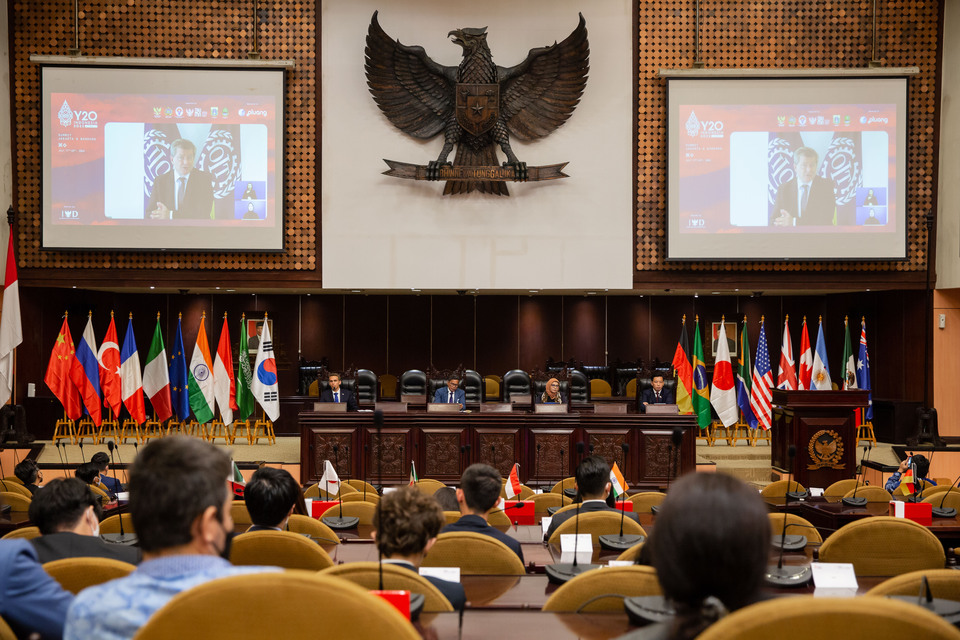Y20 Summit: ILO Calls for Formalization of Informal Economy

Jakarta. The International Labor Organization, also known as the ILO, recently called for the formalization of the informal economy, when virtually addressing the Y20 Summit in Jakarta on Monday.
According to ILO director-general Guy Ryder, six out of ten workers worldwide are making their living in informal employment. Informal workers can represent up to 80-90 percent of the employed population in some of the least developed countries.
"What we have here at the ILO, there is a very clear consensus that we are aiming at the formalization of the informal economy," Ryder told the Y20 youth delegates.
Ryder then listed reasons as to why the transition to an informal economy was necessary.
Informal economy puts governments, employer community, and workers at a disadvantage.
For governments, informality means loss of state control and tax revenues. Policymaking does not have traction on a large part of the economy.
Informal enterprises become unfair competitors to their registered counterparts because the former do not pay taxes or social security contributions.
"For the working people, the fact of the matter is the informal economy is generally synonymous with very poor and non-protective working conditions," Ryder said.
However, many of the enterprises and workers are in the informal economy not by choice, but because they are simply unable to access the formal sector.
“There is a percentage of the enterprises that willfully evade the regulations of the formal economy. But that is not the case for most," Ryder added.
To get more enterprises formalized, Ryder highlighted the need to cut bureaucratic red tapes and make the formal registration of enterprises as simple as possible.
"We also need to adjust our social security and finance systems to ensure that formalization is accompanied by the right type of benefits," Ryder told the Y20 delegates.
According to the National Statistics Agency (BPS), Indonesia had 78.14 million informal workers as of Feb. 2021. For comparison, about 77.68 million people earned their livelihoods in the informal economy as of Aug. 2020, thus marking an increase.
Demographic Dividend
Also at the Y20 Summit, Ryder pointed out the need to get youth into the labor market, particularly decent jobs, to cash in on the demographic dividend — an economic growth potential that ensues from a higher percentage of the working-age population.
“If we are unable to get young people into the labor market, demographic dividend becomes a demographic problem in terms of large-scale youth employment," Ryder told the forum while adding that labor ministers worldwide would mostly consider youth employment as a top priority.
Addressing skills mismatch by giving youth access to education and training to meet the needs of the labor market is pivotal to getting youth decent jobs.
Ryder also underscored the need to build a sustainable social protection system. The ILO director-general revealed that 53 percent of the world’s working people had no social protection.
“I don’t think having this youth dividend is a pretext for reducing the social protection system. The imperative in the world is quite the opposite," Ryder said.
"For most of the developed and emerging countries in particular, now is the time to build the social protection system that can help us navigate this rapidly changing world of work,” Ryder said, while also calling for a lifelong learning system.
Indonesia has a large productive population. About 70.72 percent of Indonesia’s citizens are of the productive age category (15-64) years. This means that Indonesia is currently experiencing a demographic dividend. Indonesia’s population stands at approximately 270.2 million people as of Sep. 2020, according to the 2020 Population Census.
Youth employment is one of the priority areas of the 2022 Y20 Summit.
Tags: Keywords:POPULAR READS
Jokowi Raises Concerns Over Money Laundering Using Crypto Assets
The amount of laundered money concealed in crypto assets globally has reached Rp 139 trillion or $8.6 billion.MRT, Japan’s Sojitz Sign $289m Deal on HI-Jakarta Kota Track Works
MRT Jakarta's deal with Sojitz include the track works and railway systems to connect Hotel Indonesia (HI) Roundabout with Kota.Taliban Suspend Two TV Stations for Neglecting Islamic Values
Many journalists lost their jobs after the Taliban takeover in 2021, with media outlets closing over a lack of funds.38 Ministries and Institutions Head to Nusantara, Led by Public Works and State Apparatus
Minister Azwar Anas revealed the 38 ministries and institutions moving to Indonesia's new capital, Nusantara, in East Kalimantan in July.Jokowi Encourages Tim Cook to Establish Apple Manufacturing Plant in Indonesia
Apple recently inaugurated a developer academy in Bali, building on the success of 3 existing academies in Batam, Surabaya, and Tangerang.Popular Tag
Most Popular






















